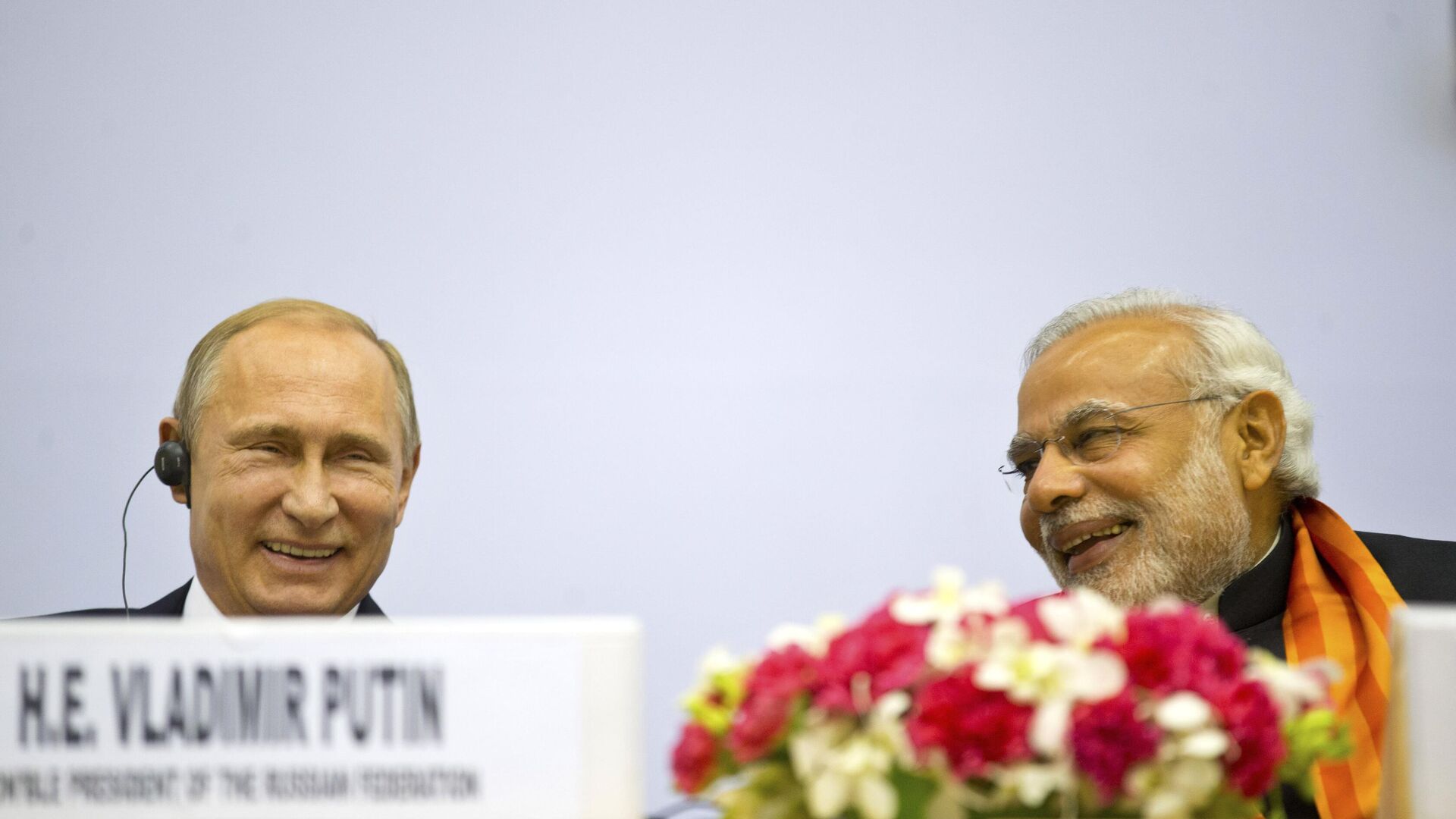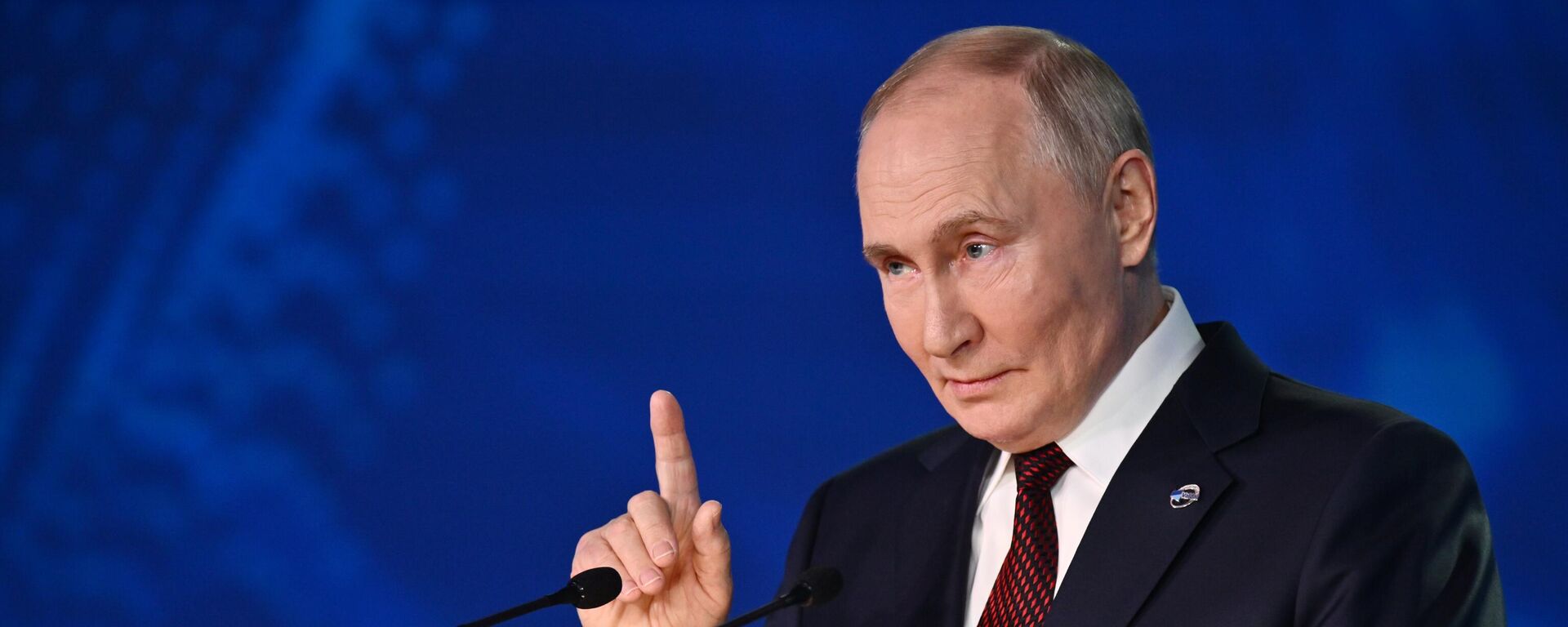https://sputniknews.in/20241112/how-russia-powers-the-make-in-india-initiative-8390920.html
How Russia Powers the 'Make in India' Initiative
How Russia Powers the 'Make in India' Initiative
Sputnik India
External Affairs Minister S Jaishankar has welcomed Moscow's growing interest in the 'Make in India', as he called for more joint ventures and other forms of collaboration.
2024-11-12T18:20+0530
2024-11-12T18:20+0530
2024-11-13T16:17+0530
indo-russian relations
s. jaishankar
india
russia
new delhi
rosneft
nato
european union (eu)
sukhoi su-30mki
vladimir putin
https://cdn1.img.sputniknews.in/img/07e8/01/0b/6170354_0:80:3358:1969_1920x0_80_0_0_5a696a2a01b101c24f44e0c849a4108b.jpg
During the Intergovernmental Commission on Trade, Economic, Scientific, Technical, and Cultural Cooperation, Jaishankar underscored the economic complementarities between Russia and India, expressing confidence that the two countries are well-placed to achieve a $100 billion trade turnover by 2030.He also emphasised the need to expedite negotiations for an India-Eurasian Economic Union (EAEU) free trade agreement (FTA) to iron out payment and regulatory barriers.India, with decades of 8% growth, values a reliable partner like Russia in energy, resources, and technology, Jaishankar stressed. India, in turn, is emerging as an 'affordable' and 'reliable' source of pharmaceuticals for Russia, aligning with New Delhi's plans to boost exports, the top diplomat highlighted.Since 2022, Russia has not only emerged as the largest source of crude for India, but is also now one of the leading exporters of coal. In terms of fertiliser exports, India began sourcing Diammonium Phosphate (DAP), Potash, Nitrogen, Phosphorus, Potassium (NPK) fertilisers from Russia at a government-to-government level in 2022. These supplies have been deemed critical for sustaining India's economic momentum, powering heavy industries and ensuring food security.Russia, with a strong base of natural resources as well as a historical industrial association with India under the 'Five-Year Plan', was indeed well-placed to help power New Delhi's economic growth and achieve the goals of the Make in India programme, experts told Sputnik India.Defence cooperation is one of the most "critical" part of Russia-India ties, Dr Raj Kumar Sharma, a senior research fellow at Indian thinktank NatStrat, told Sputnik India."Given India’s dependence on Russian military hardware, it is right time to start joint ventures in India to supply Russian spare parts to Indian armed forces," Sharma said. Cooperation in hydrocarbons, rare earth minerals, ship-building, electronics and consumer items are among other promising avenues of the collaboration, he added.He said that India's "positive economic growth forecast depended on continued access to energy and natural resources", which he described as a matter of economic and national security."Russia’s natural resources will play an important part in India’s economic growth in coming years," Sharma said.Both countries need to redouble their efforts to boost "trade and technological complementarities to factor in the skewed developments," a former ambassador Anil Trigunayat highlighted in an interview with Sputnik India.He also proposed joint projects in third countries as a way to expand economic cooperation, suggesting that Russia and India focus on trilateral opportunities, particularly in Africa, by leveraging their complementarities to achieve sustainable development goals."Energy integration" with India is anticipated to deepen in the coming months and years, Igor Yushkov, an expert at the Financial University under the Government of the Russian Federation and a leading analyst at the National Energy Security Fund, told Sputnik India in terms of crude oil exports.He largely concurred with the idea that Russian crude exports to India were more or less an "irreversible trend", noting that significant political changes were required in order to get the EU sanctions lifted and resume Russian supplies to the European markets.Russia's decision to enter the Indian market was helped by factors such as India having a "readymade business model," which included a network of coastal refineries and a market for refined fuels to other countries, Yushkov said.Dweelling on the subject of bilateral defence cooperation, seen as the main pillar of India-Russia ties, Alexey Leonkov, a military analyst and editor of Arsenal Otechestva (Arsenal of the Fatherland), told Sputnik India that what gave Russian companies an edge over their Western counterparts was the willingness to share technology with the Indian partners.He suggested that this perceived reluctance of Western companies has prevented them from advancing in the Indian market. India wouldn’t like to rely on "external military assistance" in case of a military contingency, a point not well received by these companies, the analyst further noted."Russia’s competitors in the Indian defence market view things differently; they aim to create dependency on their supply chains, which India opposes," he stated.Matters pertaining to defence cooperation are discussed under the India-Russia Inter-Governmental Commission on Military Technical Cooperation (IRIGC-MTC), co-chaired by the Defence Ministers from both sides. The next meeting of the IRIGC-TEC is scheduled to take place in December in Moscow.
https://sputniknews.in/20241108/india-is-russias-natural-partner-for-decades-president-putin-8376816.html
india
russia
new delhi
Sputnik India
feedback.hindi@sputniknews.com
+74956456601
MIA „Rossiya Segodnya“
2024
Dhairya Maheshwari
https://cdn1.img.sputniknews.in/img/07e6/0c/13/138962_0:0:641:640_100x100_80_0_0_2cb44360dbcdf6d84bf4b299cd045917.jpg
Dhairya Maheshwari
https://cdn1.img.sputniknews.in/img/07e6/0c/13/138962_0:0:641:640_100x100_80_0_0_2cb44360dbcdf6d84bf4b299cd045917.jpg
News
en_IN
Sputnik India
feedback.hindi@sputniknews.com
+74956456601
MIA „Rossiya Segodnya“
Sputnik India
feedback.hindi@sputniknews.com
+74956456601
MIA „Rossiya Segodnya“
Dhairya Maheshwari
https://cdn1.img.sputniknews.in/img/07e6/0c/13/138962_0:0:641:640_100x100_80_0_0_2cb44360dbcdf6d84bf4b299cd045917.jpg
russia india news, modi putin news, modi putin meeting, india russia joint commission meeting, russian crude exports, russian defence exports, make in india, make in india in defence
russia india news, modi putin news, modi putin meeting, india russia joint commission meeting, russian crude exports, russian defence exports, make in india, make in india in defence
How Russia Powers the 'Make in India' Initiative
18:20 12.11.2024 (Updated: 16:17 13.11.2024) Speaking at the India-Russia Intergovernmental Commission in New Delhi, S Jaishankar highlighted Moscow's growing interest in 'Make in India' and called for more joint ventures and other collaborations.
During the Intergovernmental Commission on Trade, Economic, Scientific, Technical, and Cultural Cooperation, Jaishankar underscored the economic complementarities between Russia and India, expressing confidence that the two countries are well-placed to achieve a $100 billion trade turnover by 2030.
He also emphasised the need to expedite negotiations for an India-Eurasian Economic Union (EAEU) free trade agreement (FTA) to iron out payment and regulatory barriers.
"Russia has emerged as a major supplier of fertilisers. Russia’s supply of crude oil, coal and uranium are indeed important for India," Jaishankar told the Russian delegation headed by First Deputy Prime Minister Denis Manturov, who confirmed Moscow's support for the Make in India initiative, aimed at making India a global manufacturing hub.
India, with decades of 8% growth, values a reliable partner like Russia in energy, resources, and technology, Jaishankar stressed. India, in turn, is emerging as an 'affordable' and 'reliable' source of pharmaceuticals for Russia, aligning with New Delhi's plans to boost exports, the top diplomat highlighted.
Since 2022, Russia has not only emerged as the largest source of crude for India, but is also now one of the leading exporters of coal. In terms of
fertiliser exports, India began sourcing Diammonium Phosphate (DAP), Potash, Nitrogen, Phosphorus, Potassium (NPK) fertilisers from Russia at a government-to-government level in 2022. These supplies have been deemed critical for sustaining India's economic momentum, powering heavy industries and ensuring food security.
Russia is also seen as a key partner in India's energy transition goals, being the only foreign country to date that has to co-developed civil nuclear reactors in the country. In September, an Indian-Russian joint venture also began manufacturing coaches for Vande Bharat Express under a $6.5 billion contract.
Russia, with a strong base of natural resources as well as a historical industrial association with India under the 'Five-Year Plan', was indeed well-placed to help power New Delhi's economic growth and achieve the goals of the Make in India programme, experts told Sputnik India.
Defence cooperation is one of the most "critical" part of Russia-India ties, Dr Raj Kumar Sharma, a senior research fellow at Indian thinktank NatStrat, told Sputnik India.
"Given India’s dependence on Russian military hardware, it is right time to start joint ventures in India to supply Russian spare parts to Indian armed forces," Sharma said. Cooperation in hydrocarbons, rare earth minerals, ship-building, electronics and consumer items are among other promising avenues of the collaboration, he added.
He said that India's "positive economic growth forecast depended on continued access to energy and natural resources", which he described as a matter of economic and national security.
"Russia’s natural resources will play an important part in India’s economic growth in coming years," Sharma said.
Both countries need to redouble their efforts to boost "trade and technological complementarities to factor in the skewed developments," a former ambassador Anil Trigunayat highlighted in an interview with Sputnik India.
"The surplus Indian Rupee (INR) lying in the Russian-owned Vostro accounts could be possibly used by Russian companies to make significant and strategic investments, including in the crucial defence and petrochemicals sector," Trigunayat suggested.
He also proposed joint projects in third countries as a way to expand economic cooperation, suggesting that Russia and India focus on trilateral opportunities, particularly in Africa, by leveraging their complementarities to achieve sustainable development goals.
"Energy integration" with India is anticipated to deepen in the coming months and years, Igor Yushkov, an expert at the Financial University under the Government of the Russian Federation and a leading analyst at the National Energy Security Fund, told Sputnik India in terms of crude oil exports.
"Russian companies may consider buying shares in Indian refineries. Rosneft already owns 49% stake in Essar Oil Limited, and further acquisitions are being discussed. The more integrated these markets become, the harder it will be to reverse this structure," Yushkov asserted.
He largely concurred with the idea that Russian crude exports to India were
more or less an "irreversible trend", noting that significant political changes were required in order to get the EU sanctions lifted and resume Russian supplies to the European markets.
Russia's decision to enter the Indian market was helped by factors such as India having a "readymade business model," which included a network of coastal refineries and a market for refined fuels to other countries, Yushkov said.
"In fact, almost all the oil we supplied to the EU now goes to India, where it’s a highly profitable business due to the discount. Although the current discount mainly covers transport costs, Russian oil remains cost-effective for India. We can’t fully remove this discount; otherwise, it would be cheaper for India to buy Iraqi or Saudi oil," the analyst explained.
Dweelling on the subject of bilateral
defence cooperation, seen as the main pillar of India-Russia ties,
Alexey Leonkov, a military analyst and editor of Arsenal Otechestva (Arsenal of the Fatherland), told
Sputnik India that what gave Russian companies an edge over their Western counterparts was the willingness to share technology with the Indian partners.
"This openness has enabled successful localisation, such as the production of various arms, T90 tanks and tactical aircraft like the Su-30MKI, as well as the BrahMos missile. Other countries, especially NATO members, often cite classified information when India seeks to localise production, resulting in minimal or no localisation. As a result, their achievements in this area are limited. They are unwilling to share technologies and prefer to sell military products, parts, and components while keeping production within their own territories," Leonkov emphasised.
He suggested that this perceived reluctance of Western companies has prevented them from advancing in the Indian market. India wouldn’t like to rely on "external military assistance" in case of a military contingency, a point not well received by these companies, the analyst further noted.
"Russia’s competitors in the Indian defence market view things differently; they aim to create dependency on their supply chains, which India opposes," he stated.
Matters pertaining to defence cooperation are discussed under the India-Russia Inter-Governmental Commission on Military Technical Cooperation (IRIGC-MTC), co-chaired by the Defence Ministers from both sides. The next meeting of the IRIGC-TEC is scheduled to take place in December in Moscow.



